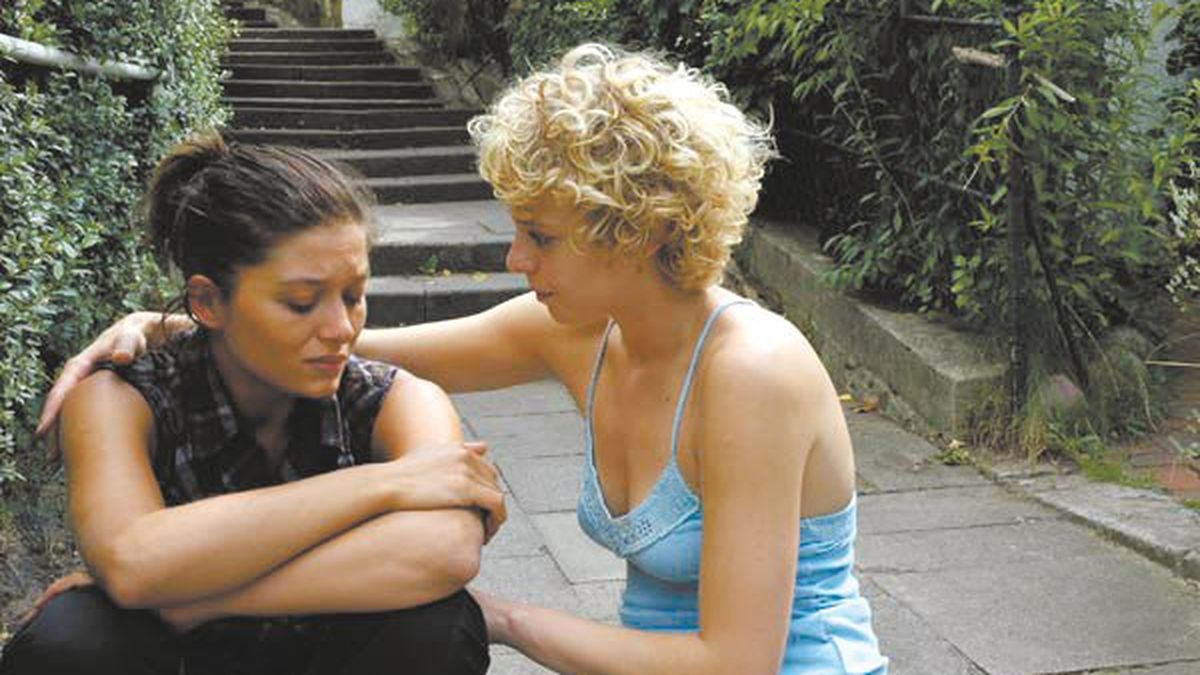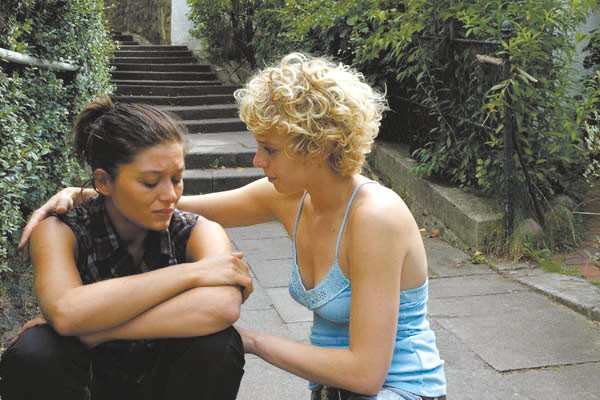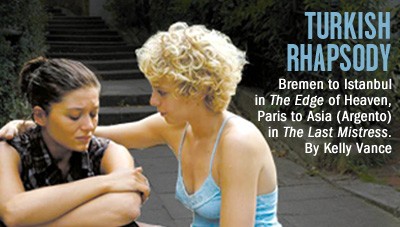The destinies of Germany and Turkey have been inextricably mingled for some time now. This was brought to the world’s attention this summer in the Euro 2008 soccer football competition, when the Turkish and German national teams played a spirited match in the semifinals (Germany won 3-2) and the loyalties of many Germans were seriously torn between the two cultures — the “host” country and the homeland of so many of its longtime “guests.”
That rich, complicated, often uneasy cultural ferment forms the background of The Edge of Heaven (aka Auf der anderen Seite), the latest film by the Turkish-German filmmaker Fatih Akin, director of the fascinating musical documentary Crossing the Bridge. The Edge of Heaven is a wistful, almost perversely elusive drama about flawed characters. With the exception of Nejat (played by actor Baki Davrak), a university professor of German who’s caught up in the middle of the story, these people are not particularly nice. They fall into that category of characters we prefer to observe from a safe distance. But as the narrative tendrils entwine them, we somehow come to care about the members of these three families in a way that we might not if they were more conventionally nondescript. Self-centered and abusive as they might be, they wear their passions openly for everyone to see. They’re unashamed, even though they probably should be.
It is Nejat’s father, Ali (Tunçel Kurtiz), who opens the Pandora’s box. The retired widower is fascinated with a bewigged prostitute in contemporary Bremen’s red-light district, mostly because she looks Turkish. And yes, Yeter (Nursel Köse) is a home girl, one with a sad story. Ali, the blunt working man, abruptly offers Yeter a deal: he’ll pay her what she could earn in the brothel to come and live with him and make love to him exclusively. Of course, to him that means that he now owns her body and soul. She accepts, much to the chagrin of Nejat, who’s embarrassed to see his father making a fool of himself over a whore. However, Nejat soon grows fond of Yeter because of her apparent devotion to her daughter back in Turkey, a college student whom she supports with her earnings.
Things happen. This is one of those non-linear movies in which the characters go off in search of each other and unknowingly pass nearby in their haste, forever failing to connect. And yet writer-director Akin keeps the narrative rhythm languid and dreamlike, never frantic despite the characters’ increasing desperation. Nejat drops everything to go to Turkey in search of Yeter’s beloved daughter, Ayten (Nurgül Yesilçay), a leftist revolutionary and would-be terrorist involved in armed anti-government assaults. But by then Ayten herself has fled to Germany, where, broke and disillusioned, she has taken refuge with a naive, trusting student named Lotte (Patrycia Ziolkowska) who lives at home with her mother, Susanne (veteran German actor Hanna Schygulla). To the distress of the mother, Lotte falls head over heels in love with Ayten.
Ayten is not a charming person. She’s evidently lived a hard life away from her mother and has developed a tough veneer in prison. Her politics are a combination of anti-colonialism and Islamic jihadism — her first contacts on arriving in Germany are with the same group of Islamist men who, unknown to Ayten, earlier confronted her mother for disgracing Islam by being a prostitute. When Lotte offers the homeless Ayten some of her clothes, she pointedly refuses a shirt with an American logo on it. As the fragile moral center of the film, Lotte and Ayten’s relationship reflects the difficulties of the characters’ cross-cultural experiment. Everyone is a seeker. Happiness is elusive and transitory. The film’s title is perfectly apt — these restless souls exist on the margins, perpetual outsiders unable to get home. The safest-feeling place in the film is the little German bookshop in Istanbul, Nejat’s hideaway.
In the end it all comes down to the soft-spoken Nejat. He and Susanne have the fortitude and peace of mind to slow down the whirlwind and recover their bearings, far off the beaten track. Davrak and Schygulla both turn in portraits of tender forbearance. Their characters bend but do not break. Filmmaker Akin takes care to show off the beauty of the Turkish landscape — the ferry ride across the Bosporus, the green hills of the Black Sea coast, the hilly neighborhoods of Istanbul. But true to its title, The Edge of Heaven hangs uneasily between two spheres. In its delicate balancing act, the common ground exists only in the hopes of its unlucky characters.
When Catherine Breillat’s The Last Mistress opened the San Francisco International Film Festival in April, it appeared to be the most coherent bit of flotsam in the wave of Asia Argento movies then crashing into Bay Area movie houses. That wave came and went in record time, and now Breillat’s 2006 costume drama is finally getting its shot at commercial art audiences.
Lost in the brouhaha over sex bomb Argento is Breillat’s barbed satire, her adaptation of French Romantic author Jules Barbey d’Aurevilly’s Une vieille maîtresse, a story of scandalous lust amongst early-19th-century Parisian aristocracy focusing on one Señora Vellini of Malaga (Argento) and her woeful effect on the dandyish Ryno de Marigny (Fu’ad Aït Aattou). As usual in Breillat’s veiled and not-so-veiled social commentaries (Fat Girl!, Romance, 36 Fillette), the ironies of the situation outweigh practically everything else — except the obvious frisson of the predatory La Vellini with Ryno, a leading man far prettier than his leading lady. Ms. Argento, of course, is provocative, a tigress posed on a tiger-skin rug, a pool of sexual quicksand — but she wouldn’t be half so much fun if it weren’t for the aged-in-lavender bitchery of Claude Sarraute and Michael Lonsdale as the gossips who set the stage for her.
In 2004, Breillat suffered a cerebral hemorrhage that paralyzed the left side of her body. She now walks with the help of a cane, but continues to create challenging dramatic commentaries that somehow manage to balance a critique of the ruling class with the juicy details of fast-lane debauchery — chicken blood in tea as a remedy, a child killed by a scorpion, the tattoo on La Vellini’s fesses, etc. Breillat wields Vellini/Argento’s wantonness like a weapon. Despite its dramatic failings, The Last Mistress displays the director’s contempt for conventionality in clear, ringing tones. 













